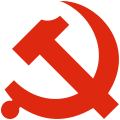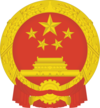اللجنة المركزية للحزب الشيوعي الصيني
 | |
| معلومات | |
|---|---|
| General Secretary | Xi Jinping |
| ينتخبه | National Congress |
| Responsible to | National Congress |
| المقاعد | Currently 205 |
| مكان لقاء | |
 | |
| Jingxi Hotel, Beijing (Working sessions) Great Hall of the People, Beijing (Opening and closing) | |
| اللجنة المركزية للحزب الشيوعي الصيني | |||||||
|---|---|---|---|---|---|---|---|
| الصينية المبسطة | 中国共产党中央委员会 | ||||||
| الصينية التقليدية | 中國共產黨中央委員會 | ||||||
| |||||||
| Abbreviation | |||||||
| الصينية | 中共中央 | ||||||
| المعنى الحرفي | Chinese-Communist Central | ||||||
| |||||||
| Alternative abbreviation | |||||||
| الصينية المبسطة | 党中央 | ||||||
| الصينية التقليدية | 黨中央 | ||||||
| المعنى الحرفي | Party Central | ||||||
| |||||||
| Shortest abbreviation | |||||||
| الصينية المبسطة | 中央 | ||||||
| الصينية التقليدية | 中央 | ||||||
| المعنى الحرفي | Central | ||||||
| |||||||
 |
|---|
|
|
The Central Committee of the Communist Party of China is a political body that comprises the top leaders of the Chinese Communist Party (CCP). It is currently composed of 205 full members and 171 alternate members (see list). Members are nominally elected once every five years by the National Congress of the Communist Party of China. In practice, the selection process is done privately, usually through consultation of the party's Politburo and its corresponding Standing Committee.[1]
The Central Committee is, formally, the "party's highest organ of authority" when the National Congress is not in a plenary session. According to the party's constitution, it is vested with the power to elect the General Secretary and the members of the Politburo and its Standing Committee, as well as the Central Military Commission. It endorses the composition of the Secretariat and the Central Commission for Discipline Inspection. It also oversees the work of various executive national organs of the party. The administrative activities of the Central Committee are carried out by the Central Committee's General Office. The General Office forms the support staff of the central organs that work on the Central Committee's behalf in between plenums.
The Committee usually convenes at least once a year at a plenary session ("plenum"), and functions as a top forum for discussion about relevant policy issues. The Committee operates, however, on the principle of democratic centralism; i.e., once a decision is made, the entire body speaks with one voice. The role of the Central Committee has varied throughout history. While it generally exercises power through formal procedures defined in the party constitution, the ability for it to affect outcomes of national-level personnel decisions is limited, as that function has generally been, in practice, carried out by the Politburo and retired party elders who retain influence. Nonetheless, Central Committee plenums function as venues whereby policy is discussed, fine-tuned, and publicly released in the form of "resolutions" or "decisions".
The Central Committee's plenums typically open and close in the State Banquet Hall of the Great Hall of the People, with the working meetings of the plenum being held at the military run Jingxi Hotel in Beijing.[2][3]
. . . . . . . . . . . . . . . . . . . . . . . . . . . . . . . . . . . . . . . . . . . . . . . . . . . . . . . . . . . . . . . . . . . . . . . . . . . . . . . . . . . . . . . . . . . . . . . . . . . . . . . . . . . . . . . . . . . . . . . . . . . . . . . . . . . . . . . . . . . . . . . . . . . . . . . . . . . . . . . . . . . . . . . .
انظر أيضاً
الهامش
- ^ Bo, Zhiyu (2007). China's Elite Politics: Political Transition and Power Balancing. World Scientific. p. 300. Retrieved 2017-10-18.
- ^ "Behind closed doors: China's most powerful politicians gather for a secretive conclave". The Economist. November 8, 2013. ISSN 0013-0613. Archived from the original on April 2, 2020. Retrieved 2020-05-09.
- ^ Lau, Mimi (13 November 2012). "The truth about Beijing's Jingxi Hotel's corridors of party power". South China Morning Post. Archived from the original on 20 October 2017. Retrieved 20 October 2017.
وصلات خارجية

